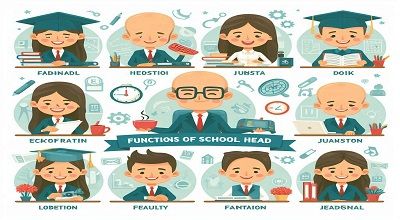Functions of School Head
The Functions of School Head, often referred to as a principal or headmaster/headmistress, are multifaceted and involve a wide range of responsibilities. The specific duties can vary depending on the type and level of the school (e.g., elementary, secondary, or higher education), as well as the policies of the education system or institution. Here are some common functions of a school head:
Leadership and Vision Setting:
- Providing leadership and establishing a clear vision for the school.
- Developing and communicating a shared mission among staff, students, and parents.
Administrative Management:
- Overseeing day-to-day operations and ensuring the efficient functioning of the school.
- Managing budgets, resources, and facilities to meet the educational needs of students.
Personnel Management:
- Hiring, supervising, and evaluating teaching and administrative staff.
- Providing professional development opportunities for staff to enhance their skills.
Curriculum Development and Implementation:
- Working with teachers and curriculum coordinators to develop and implement an effective curriculum.
- Monitoring and evaluating instructional programs to ensure they align with educational standards.
Student Affairs:
- Overseeing student discipline and behavior management.
- Promoting a positive and inclusive school culture that fosters student well-being.
Parent and Community Relations:
- Building and maintaining positive relationships with parents, guardians, and the community.
- Communicating effectively with stakeholders and addressing their concerns.
Functions of School Head in PDF Format
Educational Planning and Improvement:
- Analyzing student performance data to identify areas for improvement.
- Implementing strategies for school improvement and student achievement.
Policy Implementation:
- Ensuring compliance with educational policies and regulations.
- Implementing and enforcing school policies and procedures.
Crisis Management:
- Responding effectively to emergencies and crisis situations.
- Implementing safety protocols and ensuring a secure learning environment.
Professional Development:
- Encouraging and supporting ongoing professional development for teachers and staff.
- Staying informed about educational trends and best practices.
Advocacy:
- Advocating for the needs of the school and its students within the broader educational system.
- Engaging with educational authorities and community leaders to represent the school’s interests.
Summary
Overall, the school head plays a crucial role in shaping the educational environment, fostering a positive learning culture, and ensuring the success and well-being of both students and staff. The specific duties and emphasis on each function may vary, but these general areas capture the core responsibilities of a school head.
